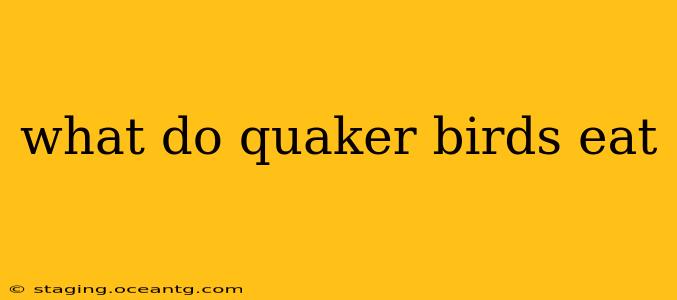Quaker parrots, also known as monk parakeets, are increasingly common sights in urban areas across the globe. Their adaptability extends to their diet, but understanding their nutritional needs is crucial for their health and well-being. This comprehensive guide will delve into what Quaker parrots eat, covering everything from their natural diet to appropriate commercial food options and the dangers of inappropriate foods.
What Do Quaker Parrots Eat in the Wild?
In their native South American habitats, Quaker parrots enjoy a diverse diet consisting primarily of:
- Seeds: A significant portion of their wild diet comes from various seeds, including those from grasses, weeds, and cultivated plants. They are adept at foraging and finding a wide variety of options.
- Fruits: Ripe fruits provide essential vitamins and sugars. They'll readily consume berries, figs, and other seasonal fruits whenever available.
- Nuts: Nuts offer healthy fats and proteins, providing energy for their active lifestyles.
- Flowers and Buds: These offer additional vitamins, minerals, and fiber.
- Insects: While not a staple, insects provide vital protein, especially important for growing chicks.
Understanding their natural diet helps us create a balanced and enriching diet for captive Quaker parrots.
What Should I Feed My Quaker Parrot?
A well-balanced diet for a pet Quaker parrot should mimic their natural food sources as closely as possible. This includes:
-
High-quality pellet food: This should form the foundation of their diet (about 60-70%). Choose a formulated parrot pellet specifically designed for medium-sized parrots. Look for options with a wide variety of ingredients and low levels of artificial colors and preservatives.
-
Fresh fruits and vegetables: Aim for a daily variety. Good choices include: apples, bananas, berries (strawberries, blueberries, raspberries), carrots, broccoli, green beans, spinach, and bell peppers. Always wash thoroughly before serving.
-
Seeds and nuts (in moderation): While seeds and nuts are a part of their diet, they should be offered sparingly (around 10-15% of their daily intake) as they are high in fat and can lead to weight gain if overfed. Sunflower seeds, peanuts (unsalted), and almonds are acceptable options in small quantities.
-
Foraging toys: These can make feeding time more stimulating and engaging, mimicking their natural foraging behaviors. Consider toys that allow them to search for hidden treats.
Important Note: Avoid avocado, chocolate, caffeine, and alcohol as these are toxic to parrots.
What Foods Should I Avoid Giving My Quaker Parrot?
Several foods are toxic or unhealthy for Quaker parrots. Always err on the side of caution and avoid these completely:
- Avocado: Contains persin, which is toxic to birds.
- Chocolate: Contains theobromine, which is toxic to birds.
- Caffeine: Can cause heart problems and other health issues.
- Alcohol: Highly toxic.
- Raw or undercooked meat: Can carry harmful bacteria.
- Salty or sugary foods: Can lead to health problems.
- Processed foods: Lack nutritional value and often contain harmful additives.
How Much Should I Feed My Quaker Parrot?
The amount you feed your Quaker parrot will depend on its age, size, and activity level. A good starting point is to offer a small amount of pellet food and fresh produce in the morning and evening, adjusting the quantities based on your bird's consumption and body condition. Consult with an avian veterinarian to establish a proper feeding plan for your individual bird. Overfeeding can lead to obesity and other health problems.
How Often Should I Feed My Quaker Parrot?
Generally, you should feed your Quaker parrot twice a day. This provides a consistent supply of nutrients and helps maintain their energy levels. However, some owners prefer to leave a small amount of pellet food available throughout the day. Observe your bird and adjust your feeding schedule accordingly.
What Supplements Do Quaker Parrots Need?
While a well-balanced diet should provide most necessary nutrients, some owners choose to supplement their bird's diet with vitamins and minerals. This should only be done under the guidance of an avian veterinarian, as excessive supplementation can be harmful.
By providing a diverse, nutritious, and stimulating diet, you can help ensure your Quaker parrot lives a long, healthy, and happy life. Remember to consult with an avian veterinarian for personalized advice and to address any specific health concerns.
